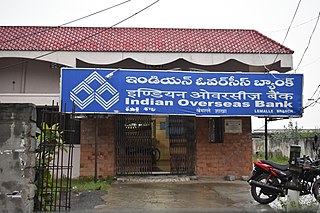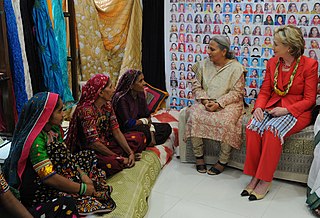
State Bank of India (SBI) is an Indian multinational public sector bank and financial services statutory body headquartered in Mumbai, Maharashtra. It is the 48th largest bank in the world by total assets and ranked 178th in the Fortune Global 500 list of the world's biggest corporations of 2024, being the only Indian bank on the list. It is a public sector bank and the largest bank in India with a 23% market share by assets and a 25% share of the total loan and deposits market. It is also the tenth largest employer in India with nearly 250,000 employees. In 2024, the company’s seat in Forbes Global 2000 was 55.

Indian Overseas Bank (IOB) is an Indian public sector bank based in Chennai. During the nationalisation, IOB was one of the 14 major banks taken over by the government of India. On 5 December 2021, IOB got Degidhan Award 2020–21 by Ministry of Electronics and Information Technology for achieving second highest percentage of digital payment transaction among public sector banks.

Modern banking in India originated in the mid of 18th century. Among the first banks were the Bank of Hindustan, which was established in 1770 and liquidated in 1829–32; and the General Bank of India, established in 1786 but failed in 1791.

Self-Employed Women's Association (SEWA), meaning "service" in several Indian languages, is a trade union based in Ahmedabad, India, that promotes the rights of low-income, independently employed female workers. Nearly 2 million workers are members of the Self-Employed Women’s Association across eight states in India. Self-employed women are defined as those who do not have a fixed employer-employee relationship and do not receive a fixed salary and social protection like that of formally-employed workers and therefore have a more precarious income and life. SEWA organises around the goal of full employment in which a woman secures work, income, food, and social security like health care, child care, insurance, pension and shelter. The principles behind accomplishing these goals are struggle and development, meaning negotiating with stakeholders and providing services, respectively.

Pratibha Devisingh Patil, also known as Pratibha Patil Shekhawat, is an Indian politician and lawyer who served as the 12th president of India from 2007 to 2012. She was the first woman to become the president of India. A member of the Indian National Congress, she also served as the Governor of Rajasthan from 2004 to 2007, and was a member of the Lok Sabha from 1991 to 1996.
HDFC Bank Limited is an Indian banking and financial services company, headquartered in Mumbai. It is India's largest private sector bank by assets and the world's tenth-largest bank by market capitalization as of May 2024.

Devisingh Ramsingh Shekhawat was an Indian agriculturist and politician who served as the first gentleman of India as the husband of President Pratibha Patil. He also served as the first gentleman of Rajasthan and also as mayor of Amravati. He was a member of the Indian National Congress.
Sant Muktabai Sahakari Sakhar Karkhana known as Sant Muktabai Cooperative Sugar Factory is a cooperative factory founded in 1988 by Pratibha Patil and others. The factory is situated at Muktainagar in Jalgaon district in Maharashtra. It was inaugurated by Sonia Gandhi on 23 January 1999, and Patil remained chairperson until 1996.
The Vishram Patil murder case gained national attention in India when the widow of the murder victim accused Pratibha Patil, the presidential nominee of the United Progressive Alliance, of shielding her brother, G. N. Patil, in relation to it.

Chetna Gala Sinha is an Indian social entrepreneur working to empower women in areas of rural India by teaching entrepreneurial skills, access to land and means of production.

Saraswat Co-operative Bank Ltd. is an urban co-operative banking institution, having its headquarters in Mumbai, Maharashtra, India and operating as a co-operative society since 1918. The Founding Members of the society were J.K. Parulkar as chairman, N.B. Thakur as vice-chairman, P.N. Warde as Secretary, and Shivram Gopal Rajadhyaksha as Treasurer.
Abhyudaya Co-operative Bank Ltd is an urban multi-state Cooperative banking institution based in Maharashtra, India and operating as a co-operative bank since 1965.
Pratibha is a Hindu Sanskrit Indian feminine given name, which means "genius", "ingenuity", "light", "intelligence", and "splendour".
Uma Subramaniam is an officer of the Reserve Bank of India, who got embroiled in the sensational Rs 20 lakh scam in December 2003 by a hoax caller claiming to be the then RBI Governor Y. V. Reddy.
Usha Ananthasubramanian is the former managing director and chief executive officer of the Allahabad Bank,
Madhavpura Mercantile Cooperative Bank (MMCB) was a Gujarat-based interstate cooperative bank that became defunct and lost its licence after it was unable to pay back the money it owed public depositors. Reserve Bank of India cancelled its licence in June 2012 under section 22 of the Banking regulations Act, 1949.
Suvarna Sahakari Bank was an Indian private urban co-operative bank based in Pune, Maharashtra, India, which operated from its incorporation on 22 September 1969 till its dissolution on 20 May 2009.
Punjab & Maharashtra Co-operative Bank Limited (PMC), was a multi-state co-operative bank that began operations in 1983. It had 137 branches spread over half a dozen states of India and nearly 100 branches were in Maharashtra. It was regulated by the Reserve Bank of India and registered under the Cooperative Societies Act.







